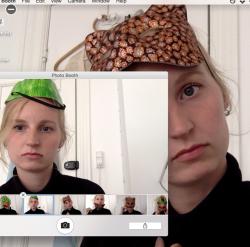Lafayette Anticipation associate curator Anna Colin talks to artist Tyler Coburn about Ergonomic Futures, a speculative project engaged with art, design, science, anthropology and writing. In this interview, Coburn discusses the research, production process and network of collaborators of a multilayered project ultimately concerned with the futures of humankind. Anna Colin: When one comes across your museum seats Ergonomic Futures (2016—) in contemporary art exhibitions—and soon in natural history, fine art, and anthropology museums—they look… [read more »]
TO VE OR NOT TO VE
As my existence becomes increasingly polarized between real and virtual worlds, I find it necessary to distinguish, in certain conversations, between real actions in the real world and contextually-equivalent virtual actions in a virtual world. For instance, I might go to a party at a friend’s house, with whom I also play an MMORPG, and also have a virtual event scheduled the next day at which both of us had planned to be virtually present. At the party, I might want to know if she still intends to virtually attend the virtual event scheduled tomorrow, but if I ask, “Will you be there tomorrow?” the real and virtual contexts of our existences start to get confused. If she still intends to “go to” the raid, she will in fact be at her house, in front of her computer, which is actually “here” at the time I ask the question. Similarly, if when I leave for the evening I say, “I’ll see you tomorrow!”, I’m being semantically inaccurate (I don’t expect to actually see her, after all), and also running the risk of confusing her, again. Perhaps she thinks I intend to stop by? Certainly I could insist on the use of clunkier phrases that are constructed to avoid this confusion, like “Will you be at the virtual event tomorrow?” and “I’ll see you tomorrow at the virtual event,” but it’s the nature of language to evolve around such contrivances, and I wanted to report how my own has begun to do so.
ve – “vee” – verb
To exist in virtuality: I will ve there.
vee – “vee” – verb
To virtually meet or be in the virtual company of: I will vee you there.
Lots of verbs are suitable for modification in this way: “I was there” becomes “I vas there” (complete with corny German accent), “I am going to kill him” becomes “I vam going to kill him,” and “I worship the God of Hate” becomes “I vorship the God of Hate,” just to give a few timely examples. And let’s not forget, for the artificially intelligent among us, the digital remix of the classic Cartesian cogito: “I vink, therefore I vam.”










































































